See also
| This disambiguation page lists articles associated with the title New People. If an internal link led you here, you may wish to change the link to point directly to the intended article. |
New People may refer to:
| This disambiguation page lists articles associated with the title New People. If an internal link led you here, you may wish to change the link to point directly to the intended article. |

The politics of Cambodia are defined within the framework of a constitutional monarchy, in which the King serves as the head of state, and the prime minister is the head of government. The collapse of communism set in motion events that led to the withdrawal of the Vietnamese armed forces, which had established their presence in the country since the fall of the Khmer Rouge. The 1993 constitution, which is currently in force, was promulgated as a result of the 1991 Paris Peace Agreements, followed by elections organized under the aegis of the United Nations Transitional Authority in Cambodia. The constitution proclaims a liberal, multiparty democracy in which powers are devolved to the executive, the judiciary and the legislature. Furthermore, the governing charter declares Cambodia to be an "independent, sovereign, peaceful, permanently neutral and non-aligned State."
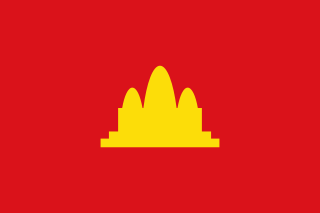
The Khmer Rouge is the name that was popularly given to members of the Communist Party of Kampuchea (CPK) and by extension to the regime through which the CPK ruled Cambodia between 1975 and 1979. The name had been coined in the 1960s by Norodom Sihanouk to describe his country's then heterogeneous, communist-led dissidents, with whom he allied after his 1970 overthrow.

Pol Pot was a Cambodian revolutionary and politician who governed Cambodia as the Prime Minister of Democratic Kampuchea between 1975 and 1979. Ideologically a Marxist–Leninist and a Khmer nationalist, he was a leading member of Cambodia's communist movement, the Khmer Rouge, from 1963 until 1997 and served as the General Secretary of the Communist Party of Kampuchea from 1963 to 1981. Under his administration, Cambodia was converted into a one-party communist state governed according to Pol Pot's interpretation of Marxism–Leninism.
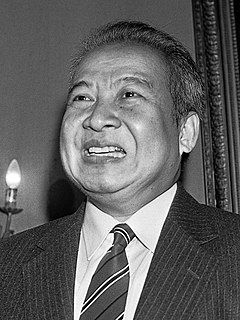
Norodom Sihanouk was a Cambodian politician who led Cambodia in various capacities throughout his political career, but most often as the King of Cambodia. In Cambodia, he is known as Samdech Euv. During his lifetime, Cambodia was variously called the French Protectorate of Cambodia, the Kingdom of Cambodia (1953–70), the Khmer Republic (1970–75), Democratic Kampuchea (1975–79), the People's Republic of Kampuchea (1979–93), and again the Kingdom of Cambodia.

Cambodia, officially the Kingdom of Cambodia, is a country located in the southern portion of the Indochina peninsula in Southeast Asia. It is 181,035 square kilometres in area, bordered by Thailand to the northwest, Laos to the northeast, Vietnam to the east and the Gulf of Thailand to the southwest.
After the fall of the Pol Pot regime of Democratic Kampuchea, Cambodia was under Vietnamese occupation and a pro-Hanoi government, the People's Republic of Kampuchea was established. A civil war raged during the 1980s opposing the government's Kampuchean People's Revolutionary Armed Forces against the Coalition Government of Democratic Kampuchea, a government in exile composed of three Cambodian political factions: Prince Norodom Sihanouk's Funcinpec party, the Party of Democratic Kampuchea and the Khmer People's National Liberation Front (KPNLF).

Hun Sen is a Cambodian politician who has served as the Prime Minister of Cambodia since 1985, the longest-serving head of government of Cambodia, and one of the longest-serving leaders in the world. He is also the president of the Cambodian People's Party (CPP) and a member of the National Assembly for Kandal. His full honorary title is Samdech Akka Moha Sena Padei Techo Hun Sen. Born Hun Bunal, he changed his name to Hun Sen in 1972, two years after joining the Khmer Rouge. From 1979 to 1986 and again from 1987 to 1990, he served as Cambodia's foreign minister. At age 26, he was also the world's youngest foreign minister.
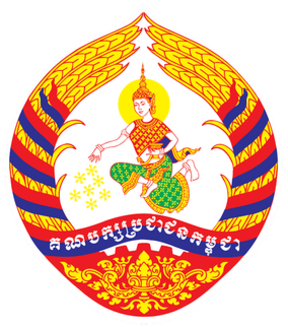
The Cambodian People's Party has been the ruling political party of Cambodia since 1979.

The Candlelight Party is a liberal party in Cambodia. The party was a member of the Council of Asian Liberals and Democrats, Liberal International, and the Alliance of Democrats.
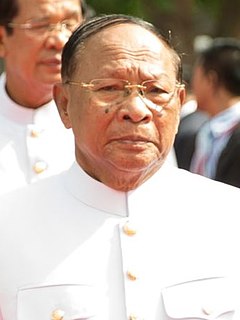
Heng Samrin is a Cambodian politician who serves as the President of the National Assembly of Cambodia. Between 1979 and 1992, he was the de facto leader of the Hanoi-backed People's Republic of Kampuchea (1979–1989) and State of Cambodia (1989–1992) and General Secretary of the Kampuchean People's Revolutionary Party from 1981 to 1991. He has been a member of Parliament since 1993. At age 86 years, he is Cambodia's oldest parliamentarian. His honorary title is "Samdech Akeak Moha Ponhea Chakrei Heng Samrin".

Cambodia is a one party dominant state with the Cambodian People's Party in power. Cambodia's legislature is chosen through a national election. The general election is held every five years in the fourth Sunday of July. The Parliament of Cambodia has two chambers. The National Assembly of Cambodia has 125 members, each elected for a five-year term by proportional representation. The Senate has 62 members, mostly indirectly elected.

The Cambodian–Vietnamese War, known in Vietnam as the Counter-offensive on the Southwestern border, and by Cambodian nationalists as the Vietnamese invasion of Cambodia, was an armed conflict between Democratic Kampuchea, controlled by the Khmer Rouge, and the Socialist Republic of Vietnam. The war began with repeated attacks by the Kampuchean Revolutionary Army on the southwestern border of Vietnam, particularly the Ba Chuc massacre which resulted in the deaths of over 3,000 Vietnamese civilians. On 25 December 1978, Vietnam launched a full-scale invasion of Kampuchea, and subsequently occupied the country and removed the government of the Communist Party of Kampuchea from power.

The Khmer People's National Liberation Front was a political front organized in 1979 in opposition to the Vietnamese-installed People's Republic of Kampuchea (PRK) regime in Cambodia. The 200,000 Vietnamese troops supporting the PRK, as well as Khmer Rouge defectors, had ousted the brutal Democratic Kampuchea regime of Pol Pot, and were initially welcomed by the majority of Cambodians as liberators. Some Khmer, though, recalled the two countries' historical rivalry and feared that the Vietnamese would attempt to subjugate the country, and began to oppose their military presence. Members of the KPNLF supported this view.
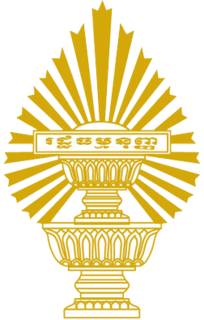
The National Assembly is one of the two houses (chambers) of the Parliament of Cambodia. It is referred to as the lower house, with the Senate being referred to as the upper house.

The United Nations Transitional Authority in Cambodia (UNTAC) was a United Nations peacekeeping operation in Cambodia in 1992–93 formed following the 1991 Paris Peace Accords. It was also the first occasion on which the UN had taken over the administration of an independent state, organised and run an election, had its own radio station and jail, and been responsible for promoting and safeguarding human rights at the national level.

The People's Republic of Kampuchea, also referred to as the Vietnamese occupation of Cambodia, was founded in Cambodia by the Salvation Front, a group of Cambodian communists dissatisfied with the Khmer Rouge after the overthrow of Democratic Kampuchea, Pol Pot's government. Brought about by an invasion from Vietnam, which routed the Khmer Rouge armies, it had Vietnam and the Soviet Union as its main allies.

The Communist Party of Kampuchea, also known as the Khmer Communist Party was a communist party in Cambodia. Its leader was Pol Pot and its followers were generally known as Khmer Rouge. Originally founded in 1951, the party was split into pro-Chinese and pro-Soviet factions, as a result of the Sino–Soviet split. As such, it claimed 30 September 1960 as its founding date, then as the Workers' Party of Kampuchea before being renamed the Communist Party in 1966. The party was underground for most of its existence and took power in the country in April 1975 and established the state known as Democratic Kampuchea. The party lost power in 1979 with the establishment of the People's Republic of Kampuchea by leftists who were dissatisfied by the Pol Pot regime and by the intervention of Vietnamese military forces after a period of mass killing. The party was officially dissolved in 1981, with the Party of Democratic Kampuchea claiming its legacy.

The Community of Royalist People's Party was a Cambodian political party that lasted from March 2014 until January 2015. It was founded and led by Norodom Ranariddh, who had been ousted from FUNCINPEC back in 2006. Ideologically a royalist party, the CRPP drew its inspiration from the political legacy of the former King of Cambodia, Norodom Sihanouk, and competed for its voter base with both FUNCINPEC and the Cambodia National Rescue Party (CNRP). In January 2015, the CRPP was dissolved when Ranariddh returned to FUNCINPEC.